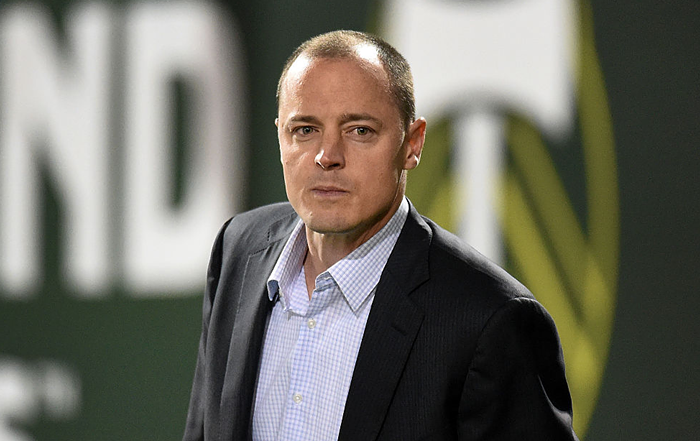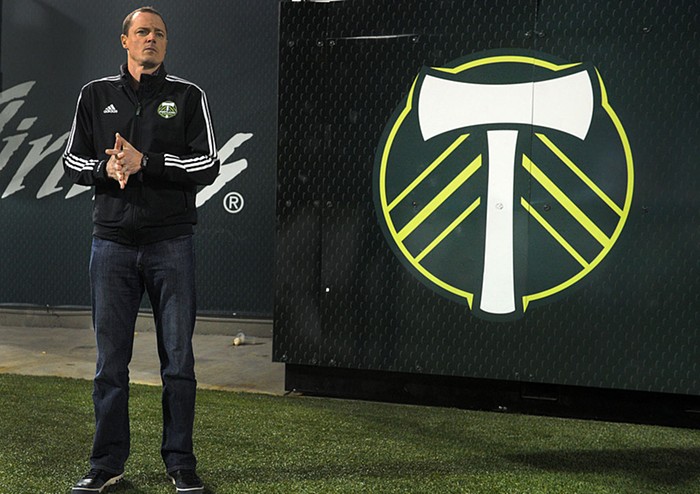
In it, the Timbers doubled down on a position that has drawn an increasing amount ire over the last several weeks: that Major League Soccer's ban on the antifascist Iron Front symbol and political speech in stadiums is necessary, good, and popular with a significant segment of the team's fanbase.
This all despite the fact that "the sport of soccer has long been a stage for support of human rights," and that the Timbers "stand steadfast against fascism."
The statement is worth reading in full, if only to get a more thorough sense of the needle the club is trying to thread — between what is political and what isn't, what qualifies as a human rights issue and what doesn't, and, of course, how it can stand steadfastly against fascism as it stands steadfastly by a ban on antifascist imagery.
In past years, the Timbers Army and other supporters groups around the league flew the Iron Front without incident. But in March, MLS released a new Fan Code of Conduct banning "political" signage in stadiums across the league.
Suddenly, with fascism ascendent both in this country and beyond it, a symbol communicating solidarity with vulnerable people and opposition to ethnonationalism was blacklisted. Fans, especially this summer, have fought back.
The Timbers Army has been at the forefront of that fight, leading a social media campaign, selling t-shirts with the Iron Front printed on them, and providing materials for supporters to stencil the symbol onto their own shirts ahead of the game against Vancouver on August 12.
The Timbers' statement yesterday arrived in the face of that backlash.
Their position seems to be this: the ban on political speech is coming from MLS, and every club in the league, whether they know it or not, is subject to it.
In fact, the Timbers argue that they allow for more speech in their stadium than they are required to, because, while political speech is outlawed, speech advocating human rights is not — and the Timbers, according to the Timbers, have always had "a particularly liberal view of what are human rights."
But the Iron Front does not fall under this generous human rights purview. It is instead considered by the league to be "inherently political," and therefore inappropriate for large-scale display in stadiums, because "it has been co-opted by antifa."
Why is this a problem? Because, according again to the club, most people today are "unaware of the Iron Front and its historic meaning," and instead associate it with "violence," putting it at odds with the club's "responsibility to promote safety... [and] inclusion in Providence Park."
"We didn’t make the rule banning the Iron Front on signs," the Timbers wrote, "but we understand it and support it."

If what the Timbers claim is true, that the general public simply does not know the history of the Iron Front and what it represents, their decision to support a ban on the logo — rather use their considerable reach to help educate people as to its meaning — is deeply frustrating.
The truth is that the line between politics and human rights, between what is acceptable under this Fan Code of Conduct and what is not, does not exist in any ideologically neutral way. The only line here is what symbols the league and its clubs want to associate themselves with and what symbols they don't.
The Timbers make this clear in the statement, when they describe the American flag, another symbol frequently associated with violence, as "clearly different" from the Iron Front, but neglect to explain why.
They make it clear when, after congratulating themselves for supporting marriage equality in Oregon in 2014, they announce their newfound belief "that gun control is also something that has moved into the human rights spectrum."
The idea that something can "move into the human rights spectrum" is ludicrous — human rights are inalienable, they do not shift given the mood of a professional soccer team — but it illustrates just how arbitrary the Iron Front ban is.
The Timbers have long been comfortable with marriage equality, and that's a credit to them. They're apparently comfortable with gun safety advocacy as well. But they are not comfortable associating themselves too explicitly with the battle against fascism, and for that, they deserve to be pilloried.
It's a cowardly position made that much worse by the fact that the city in which they play has been targeted time and again in recent years by people who attempt to use it as a staging ground for fascist rallies, marches, and, yes, violence.
One of those fascist gatherings took place just last weekend, the same weekend that a Timbers player and his wife were the victims of racist insults.
No one is suggesting that the Timbers support fascism. What they are suggesting is that by supporting the Iron Front ban, they are creating space for a political movement that physically endangers a great number of their players, staff, and supporters.
The club is standing by their original position. Now, supporters who oppose it need to stand by theirs. That means keeping up the pressure — calling and writing the front office and club sponsors, buying food, drinks, and merchandise outside of the stadium, and wearing the Iron Front inside of it.
This activism is already having an impact. That the Timbers felt compelled to produce this statement at all, to make their case publicly, is a victory for those people who want to see the league's policy struck down.
The Oregon chapter of the Council on American-Islamic Relations has offered to sit down with the club to discuss the situation. The Timbers have a big game on Friday night, and their most visible, vocal supporters will again make every effort to communicate their stance.
Soccer is political. The Timbers know it. So they should know also that this fight is just getting started.




















